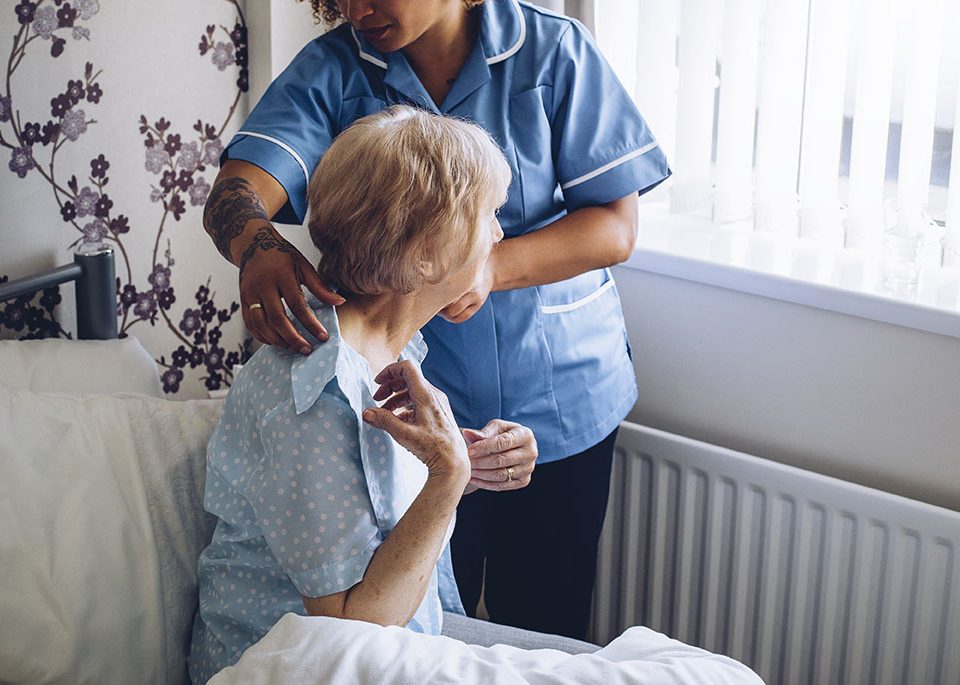Care Partners: Pioneering the Hospital-at-Home Initiative

As the world and our communities waged war against Covid-19 over the past year, Care Partners has been on the frontlines. Care Partners is uniquely equipped to help hospitals meet the Centers for Medicare & Medicaid Services (CMS) requirements for the Acute Hospital Care at Home Waiver program.
The hospital-at-home initiative has proven to improve patient outcomes while cutting costs. In addition, the hospital-at-home program can expand your hospital’s reach in the community allowing you to achieve significant measures of success within the “Triple AIM.” This guide will provide everything you need to know about the Hospital at Home program and how Care Partners can help bring this innovative program to your institution.
What is the Hospital-at-Home program?
A hospital-at-home program essentially admits medium acuity patients who are stable to undergo hospital-level monitoring and care from the comfort of their homes. At-home admittance either shortens the patients’ in-hospital stay or replaces it entirely.
Some hospitals choose to run their hospital-at-home program from their emergency department. Others may rely on paramedics from the community or specialty clinics to refer patients to the program.
Still, others may refer entire patient populations to a hospital-at-home program instead of receiving care on campus. These populations could include oncology departments or post-surgical monitoring from home.
In the battle against Covid-19, other hospitals have opted to send stable Covid patients to be monitored from home, freeing up beds for those who need intensive care.
However your institution decides to implement a hospital-at-home program, the basics of it remain the same.
How Does the Hospital-at-Home Work?
Despite being off-campus, hospital-at-home patients are never far from the care they need. By using a combination of telehealth technology and in-person visits, patients can receive hospital-quality care.
Biometric monitoring systems can provide live data to care teams from a distance. Care providers can visit daily to administer protocols, and physicians are available for in-person or video check-ins.
Just because a patient may be admitted into their home doesn’t mean they will receive inferior care and services. They can still receive top-notch clinical and ancillary services like these from the comfort of their home:
- Diagnostic studies like x-rays, electrocardiograms, and echocardiograms can be administered.
- Treatments including oxygen therapy, intravenous fluids, and intravenous antibiotics can be received at home.
- Services provided by health care teams can include respiratory therapy, pharmacy services, and services from skilled nurses.
Hospital-at-home care and services are based on the patient’s needs and care protocols. All hospital-at-home patients should be visited by their care team and physician once a day, with vitals monitored remotely. When a patient is admitted to at-home care, the presiding physician writes their orders, and a care team is dispatched to the patient’s home to deliver and set up medical supplies.
When a hospital-at-home patient is well enough to be discharged, the medical supplies are removed from their home, and the patient receives outpatient follow-up from their primary care physician.
Patient Home Requirements
For a hospital-at-home admittance to be successful, the patient’s home needs to be able to safe and comfortable. The patient needs to have internet access for the telehealth systems. The patient also needs running water, heating, cooling, access to food, and social support.
Hospital-at-home admittance provides healthcare providers an opportunity to assess the patient’s social needs by identifying unsafe living conditions, social challenges, and access to food. If a potential hospital-at-home patient has an immediate need, healthcare providers can connect the patient to local social services.
How Do Hospital-at-Home Programs Benefit Patients?
Research from participating hospitals has found that hospital-at-home programs improve every aspect of the patient value equation. Patients have improved outcomes over in-hospital care, report higher care satisfaction, and save money on overall treatment.
Improved Outcomes
Patients admitted to Mount Sinai’s hospital-at-home program reported shorter hospital stays as well as reduced instances of:
- Complications
- Emergency department visits
- Hospital readmission rates
With hospital-at-home care, patients at Mount Sinai also reported higher patient satisfaction and lower care costs.
Cost
Across the board, hospital-at-home programs report the costs of stay to be an average of 25% percent lower than on-campus admissions. This significant cost difference is due to fewer low-cost services and consultations being provided.
Experience
Hospital-at-home patients are more physically active, receive better social care, and are simply more comfortable in their own homes. These factors have an impact on their quality of life while admitted and help improve patient outcomes.
How Can Care Partners Help?
Teams of Mobile Professionals
Our experience and expertise in caring for high acuity patients in post-acute settings have made us well-suited to exceeding the requirements of the CMS Waiver program. We have already developed an entire acute care team for the Hospital-at-Home program alongside our partner Acacia Health. Our professional healthcare team includes professionals from many disciplines who meet all patient needs:
- Physicians
- Nurse Practitioners
- Nurses
- Physical Therapists
- Occupational Therapists
- Speech Therapists
- Social Works
- Personal Care Attendants
Care Partners can offer extra services that include food and nutrition help, mobile labs, DME, non-profit resources, and other medical and non-medical services that improve the quality of life for our patients. Our additional teams of mobile services to further support Hospital-at-Home programs and improve patient outcomes.
CMS Waiver Application Assistance
Care Partners can help your hospital successfully apply for the CMS Hospital-at-Home Waiver. Our unique expertise and professional healthcare teams can provide your institution with the logistical and technical solutions necessary to meet the waiver requirements.
We are proud to have worked alongside UCIMC through every step of their application process, allowing them to be one of the first 100 hospitals in the nation to be awarded the CMS waiver and begin a hospital-at-home program.
Care Partners is excited to offer our support to other hospitals. By partnering with us, we can assist with:
- Initial CMS Waiver application
- CMS interview and obtaining the waiver
- Implementing a full or partial hospital-at-home program integration with your hospital provided by ACP health
- A full or partial ancillary package for supplemental services
Helping your hospital establish an effective hospital-at-home program is just one way Care Partners can help serve our communities. Together, we can provide superior care to those who need it.
Conclusion:
Hospital-at-home programs are proving effective at improving patient outcomes while reducing care costs. Implementing a hospital-at-home program should be the goal of every hospital. If your institution needs help at any point in the CMS Waiver application process or if you would like to learn more about how hospital-at-home can benefit your community, please reach out today.


